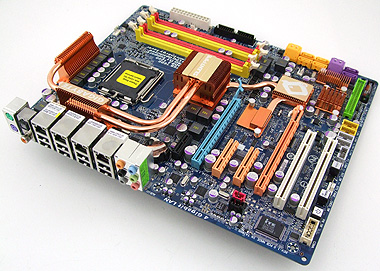
How is it that Intel's mainstream P45 Express chipset is
the centerpiece of Gigabyte's EP45-DQ6 motherboard, which retails for around $280? Are you missing out on a
lot by sticking with the Intel P45 Express chipset when you could find an Intel
X48 board for about the same?
No, not really. The only notable difference between the
two chipsets comes down to running two high-end AMD Radeon videocards in Crossfire mode. In
that case, Intel's X48 chipset has sufficient PCI Express lanes that it can
provide 16 lanes of bandwidth to each videocard. The P45 Express can manage 8
lanes of bandwidth each to Crossfire'd videocards. This can theoretically
bottleneck faster video cards, but realistically that's unlikely to cramp your
gaming style.
The Gigabyte GA-EP45-DQ6's feature list is extensive,
almost to the point of overkill. It's hard not to see the benefit of nearly a
dozen SATAII ports with support for various modes of RAID between them... four
of which can be hooked up to the supplied brackets to full fill the otherwise
vacant eSATA role. Certainly, plenty of USB2.0 is a welcome sight, but three
FireWire ports seems a little excessive. The going rate for Firewire devices is
two. The situation really goes HUMVEE when it comes to networking. The Gigabyte
GA-EP45-DQ6 has four PCI Express based Gigabit LAN (10/1000) connectors on the
rear I/O panel. These four RJ-45 connections support network teaming - a method
of joining individual network connections for added throughput - which can
improve data connectivity substantially under the right conditions, at a LAN
gaming event, or with critical applications when there is a need or network
redundancy. Still, four Gigabit LAN ports? Two would have been more than
enough.
One of the more unique technologies at play here is Gigabyte's Dynamic Energy Saver (DES) Advance. When
activated, it yields a modicum of power thriftiness to lessen your electrical
footprint, and over the course of an entire year lower power bills. Motherboards
with power saving features should be standard. If every computer on the planet
had an energy efficient A-PFC power supply, motherboard and low power
processor, the impact of computers would certainly be reduced.
As it stands, in PCSTATS tests the Gigabyte GA-EP45-DQ6
motherboard and its DES technology was good for shaving off 8W of power use
under heavy processor load, 3W while idle. Still, technologies like Gigabyte's
DES, and ASUS' EPU are a step in the right direction and PCSTATS actively
encourages all motherboard makers to develop this further. As to which
technology is more power efficient... well that's an article for another time.
;-)
Gigabyte's overall attention to detail really shines
through once the GA-EP45-DQ6 is placed under close inspection - the labeling for
the USB and other headers, the LED indicators next to the memory and PCI express
components make troubleshooting easier and the handy click-connect SATA cables
are all evidence of thought put into making the end user experience as smooth
and easy as possible.
On the overclocking front PCSTATS was able to push the
GA-EP45-DQ6 board to speeds of 525MHz FSB with an Intel Core 2 Duo E8400 processor
and a trusted pair of Corsair's DOMINATOR Twin2X2048-8888C4DF DDR2
memory. Ultimately, the Gigabyte GA-EP45-DQ6 motherboard is suitable for a
Crossfire gaming PC or workstation computer with future PCI Express peripheral
expansion on the horizon. For the enthusiast who has a bit of extra cash and
wants a motherboard which supports network teaming, that's easy to troubleshoot
and overclock while providing essential Crossfire support, the Gigabyte EP45-DQ6
is well worth considering.

Find out about this and many other reviews by joining
the Weekly PCstats.com Newsletter today! Catch all of PCSTATS
latest reviews right here.
Related Articles
Here are a few other articles that you might enjoy as
well...
- ECS A780GM-A AMD 780G Motherboard Review
- Biostar TF8200 A2+ GeForce 8200 Motherboard Review
- Foxconn A7DA-S AMD 790GX Motherboard Review
- MSI X48 Platinum Intel X48 Express Motherboard
Review
- MSI P35 Platinum Combo Intel P35 Express Motherboard
Review
- ECS P45T-A Intel P45 Express Motherboard Review
- Biostar TPower I45 Intel P45 Express Motherboard
Review
- ASrock Penryn 1600SLI X3-WiFi nForce 680i SLI Motherboard Review
